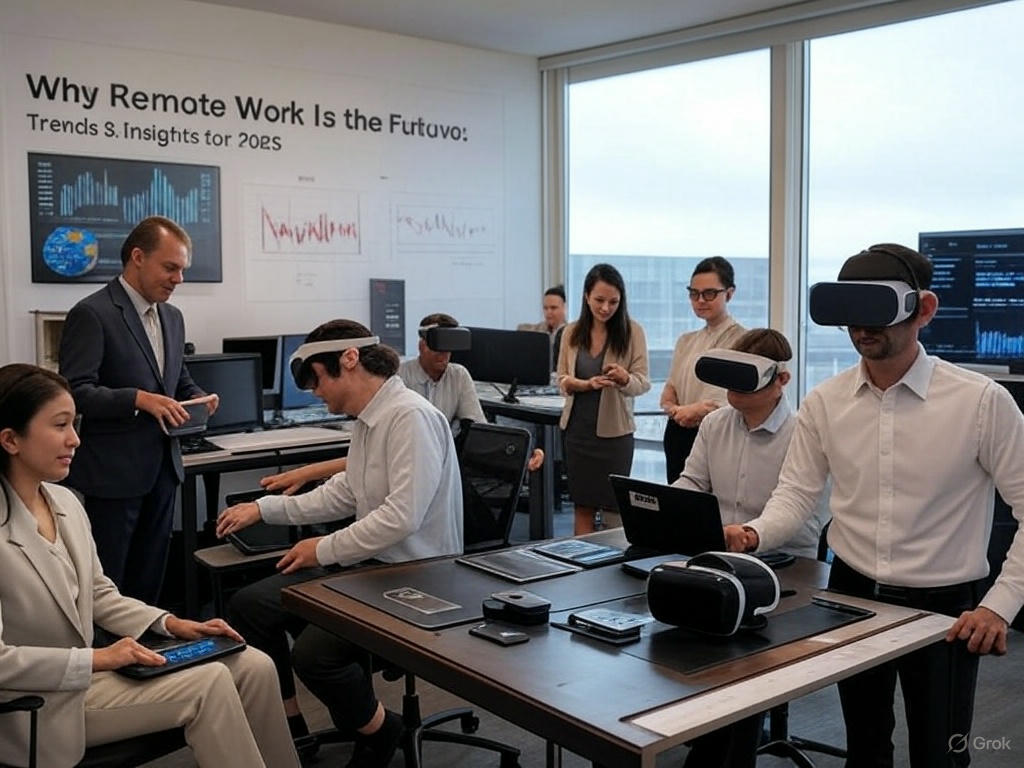Software developmentdifficultyRemote Jobs
Why Remote Work Is the Future: Trends & Insights for 2025
M
Muhammad Aamir Yameen
03-26-2025
30 mint mint read

Remote work has transformed from a temporary necessity into a permanent shift in the modern workforce. As we move into 2025, businesses and employees are embracing remote work models due to their flexibility, cost-effectiveness, and productivity benefits. This article explores why remote work is the future, the latest trends, and how companies can adapt to the evolving work landscape.
The Rise of Remote Work
The COVID-19 pandemic accelerated the adoption of remote work, but even post-pandemic, companies have continued to invest in flexible work arrangements. According to a recent study, over 60% of companies now offer remote or hybrid work options, and that number is expected to grow in 2025.
Key Drivers of Remote Work Growth
- Technological Advancements – High-speed internet, cloud computing, and collaboration tools like Slack, Zoom, and Microsoft Teams make remote work seamless.
- Work-Life Balance – Employees prefer remote work as it reduces commuting time and allows for greater work-life integration.
- Cost Savings for Businesses – Companies save on office rent, utilities, and commuting allowances by enabling remote work.
- Access to Global Talent – Organizations can hire the best talent worldwide without geographical restrictions.
- Employee Productivity – Studies show that remote employees are often more productive than in-office workers due to fewer distractions and a more personalized work environment.
Trends Shaping Remote Work in 2025
1. Hybrid Work Models
Many organizations are adopting hybrid work structures, allowing employees to work remotely part of the time while maintaining an office presence. This approach offers the best of both worlds—collaborative office interactions and individual productivity from home.
2. AI & Automation in Remote Work
Artificial intelligence and automation tools are enhancing remote work productivity. AI-driven project management, virtual assistants, and automated scheduling help employees manage their time effectively.
3. Virtual Reality (VR) Workspaces
With the rise of the metaverse, VR-based workspaces are becoming a reality. Companies like Meta and Microsoft are developing virtual office environments where employees can collaborate as if they were in the same physical space.
4. Cybersecurity Measures
As remote work increases, so do cybersecurity threats. Companies are investing in advanced cybersecurity protocols, including VPNs, zero-trust security models, and AI-powered threat detection systems.
5. Remote Work Policies & Legal Regulations
Governments worldwide are introducing remote work policies, including tax benefits, labor laws, and compliance regulations. Businesses need to stay updated to ensure legal compliance.
How Companies Can Thrive in a Remote-First World
1. Invest in the Right Tools
Companies should equip employees with high-quality laptops, noise-canceling headphones, and software tools that enhance collaboration and efficiency.
2. Focus on Employee Well-Being
Employers must prioritize mental health by offering flexible work hours, virtual wellness programs, and regular check-ins to maintain employee engagement.
3. Redefine Company Culture
A strong company culture should not be limited to physical offices. Virtual team-building activities, online retreats, and digital recognition programs can help maintain a cohesive remote workforce.
4. Enhance Cybersecurity
Businesses should implement multi-factor authentication (MFA), encrypted communications, and cybersecurity training to protect remote employees from potential threats.
5. Promote Career Growth and Learning
Organizations should offer virtual training programs and remote learning opportunities to keep employees motivated and upskilled.
Conclusion: The Future of Remote Work
Remote work is not just a trend—it is the future of work. Companies that embrace remote-friendly policies and invest in digital transformation will thrive in 2025 and beyond. Employees, in turn, will enjoy greater flexibility, improved well-being, and enhanced career growth opportunities.
For more insights on remote work trends, visit StacksGather.
M
Muhammad Aamir Yameen
Software Engineer